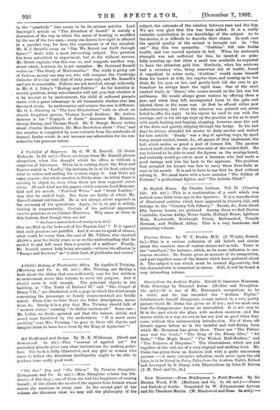" The One" Dog and " The Others." By Frances
Slaughter: (Lengtnans and Co. 5s. net.)—Miss Slaughter relates the life- stories of five dogs ; one of them she had the happiness of owning herself ; of the others she received the reports from friends whose names she mentions in every case. In the second _part of her volume she discusses what we may call the philosophy of the
subject, the rationale of the relation -between man and the dog. We are very glad that this has been added. , It is a really valuable contribution to our knowledge of the subject. As to the stories, it is difficult to describe their charm. In each case the special quality of the animal is brought out. In "the
one" dog this was sympathy. Gubbins ' fell into feeble health, and was carried upstairs to bed. When his mistress's strength was not sufficient for this, he insisted on ' pain- fully crawling up ; but when a maid was available he expected to have the attention paid him. Similarly, when his mistress had a secretary who, being somewhat out of health, found it expedient to retire early, Gubbins ' would rouse himself from his basket at 9.30, the regular time, and coming up to her chair, fix his eyes on her, and gently bark till she rose to go. Somehow he always knew the right time. One of the most marked traits in ' Bruce,' who comes second on the list, was his politeness. He would always greet visitors by offering them a paw, and when they left accompanied them to the gate and saluted them in the same way. At first he offered either paw indiscriminately, but when the solecism was pointed out, never failed to offer the right. In his vigour he used to run with the carriage, and in his old age kept up the practice so far as to start with much barking and leaping, stopping, however, near the end of the drive and quietly slipping through the hedge. In his last days he always attended his master to daily service and waited for him outside. Bandy' was a dog of sporting ways, by sport being meant cricket, tennis, &c., all games of that implement, the ball, which makes so great a part of human life. The passion showed itself chiefly at the practice-nets of the cricket-field. Ho was believed to be able to read the figures on the scoring-board, and certainly would go out to meet a batsman who had made a good innings and join his bark to the applause. The problem that occupied his leisure was how to carry three fives-balls at once in his mouth. It is sad to have to say that be died without solving it. We must leave with a bare mention "The Soldier of Fortune," a professional fighter, and "The Artistic Thief."










































































 Previous page
Previous page